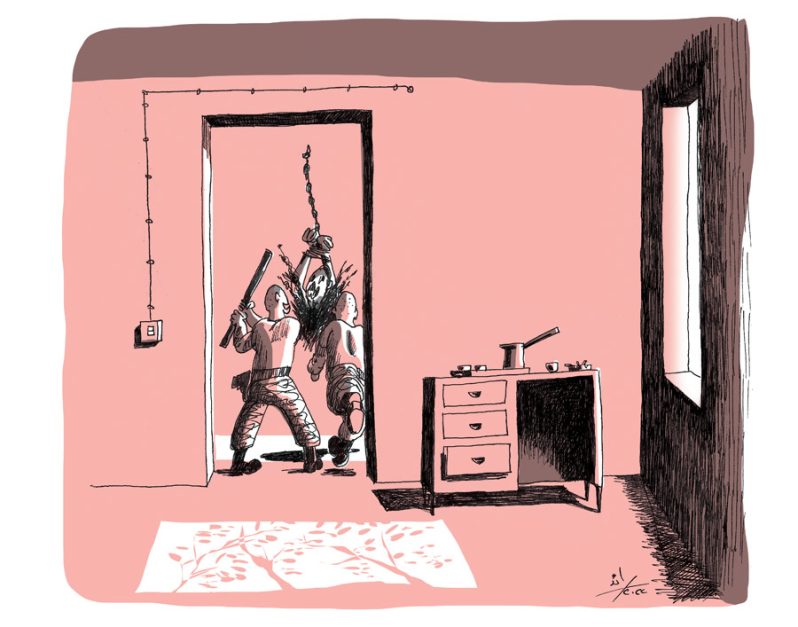State of Emergency and Emergency State Security Courts: Is it Over?

On 15 October 2018, the president of Egypt declared a state of emergency throughout the country for the fourth time in a year and a half.[1] It had become routine in Egypt for a three-month state of emergency to be declared, and then for a new state of emergency to be announced just two or three days following the end of the first. Once that state of emergency ended another would be announced, again following a short interval, and so on. This effectively amounts to a constant declaration of a state of emergency. The Egyptian state uses the short intervals between emergencies to circumvent the Constitution, which forbids the declaration of a state of emergency lasting more than six months. Yet as a result of this evasion, the state is failing to enforce the legal provisions entailed in the end of a state of emergency. As a result we are left with a state of emergency that ends but in name only given that emergency courts will operate on a permanent basis, in contravention of the law and beyond their jurisdiction, as this article will show.
It is worth pointing out that before 25 January 2011, the president could declare a state of emergency for a specified period of time, and then with the approval of the People’s Assembly, extend it with no maximum end point. Hence the state of emergency declared on 6 October 1981 lasted for 31 years after being extended multiple times before it was ended on 31 May 2012.[2][3] For this reason, after January 2011 the 1971 Constitution was amended so that a state of emergency could not be declared for more than six months and could not be extended except pursuant to a popular referendum.[4]. This regulation reflected a desire to dispense with the previous legacy and place a limit on the presidential power to declare a state of emergency. This new rule stayed in place in the 2012 Constitution.[5] In the 2014 Constitution, it was amended, shortening the state of emergency to three months, at the end of which a state of emergency ends in accordance with constitutional statute. The provision regarding a popular referendum was also replaced; an extension now requires only the approval of the House of Representatives.[6]
The Temporary Nature of Emergency Courts
To begin with, the very existence of national security (emergency) courts is invalid because they are “exceptional,” and the Constitution prohibits the establishment of exceptional courts.[7] This aside, they are also temporary courts by nature. Their jurisdiction is therefore time-limited and its existence (or lack thereof) tied to the declaration of a state of emergency. Even when a state of emergency is declared, the court does not automatically convene on its own accord; rather the president or his delegate must issue a decree appointing its members.[8] The decree making the appointments lapses and is no longer in force once the state of emergency, which is the basis for the issuance of the decree in the first place, ends. The same applies to all decrees issued by emergency powers.[9]
The very existence of the decrees appointing judges to these courts is therefore linked to the existence of the decree declaring the state of emergency. Once the latter is no longer in effect, the former lose all future executive force and have no foundation, justification, or support. Thus whenever a new state of emergency is declared, regardless of whether it is ten years, one year, or even two days after the end of the previous state of emergency, an emergency power must reissue every decree it wishes to implement and enforce – even if equivalent decrees had been issued previously.
On the basis of the state of emergency declared on 10 April 2017, the prime minister issued a decree appointing members of state security courts on 4 May 2017.[10] With the end of the previous state of emergency, the decree that had put it into place had become null and void and lost its future executive force. Therefore the state, upon declaring a new state of emergency, also had to issue a new decree appointing members of the state security courts, even if its members remained the same.
The state did not do this, however. The state security courts continued with their previous makeup and members, remaining in operation and convening continuously from the previous state of emergency. Following the April 2017 declaration of a new state of emergency the state security courts continued to convene absent the issuance of a new decree appointing its members. Therefore the convening of these courts was invalid, and all of their proceedings, from trials to rulings, should be considered as issued by a court that was not legally convened. This reduces rulings to the point of nonexistence.
Time-limited Jurisdiction for Emergency Courts
In addition to the lapsing of the decree appointing members of the emergency courts, their very jurisdiction is time-limited: it ends the day that the state of emergency ends. Legislators took particular steps to address this issue: Article 19 of the Emergency Law specifies that when a state of emergency ends, the jurisdiction of such courts extends only to the cases it is already hearing.[11] Consequently, if a division of the court is not considering any cases when a state of emergency ends, its existence, legally speaking, ends immediately. Divisions that are hearing cases only continue to exist temporarily, until they finish hearing the cases that have already been referred to them. The second section of Article 19 further specifies in no uncertain terms that if the state of emergency ends, all cases instigated prior to the end of the state of emergency and investigated by the public prosecutor’s office but not yet referred to the emergency courts must, by law, be referred to the ordinary courts.[12] What happens then, if a state of emergency is declared anew, as is the case now, and the president issues a decree referring certain ordinary crimes to the state security courts? Do outstanding cases like these revert to the jurisdiction of state security courts, whose jurisdiction they had previously left? The answer is a categorical no for the following reasons:
First, if each state of emergency is independent from the previous one – as the state claims in order to justify its repeated declarations of a state of emergency – then the state must apply all provisions of the Emergency Law regarding both the beginning and end of a state of emergency. The state cannot choose the legal provisions that suit its wishes and pronounce that others do not conform with its current approach. The refusal to implement these legal provisions renders the end of the state of emergency a mere formality. This only affirms the fact that the state of emergency declared a year and a half ago remains in force today, in violation of the Constitution.
Second, if the presidential decree specifies ordinary crimes to be referred to the emergency courts, the public prosecution is not obligated to do so. It is up to the prosecution whether to refer such crimes to the emergency courts or to the ordinary courts. This is because a presidential decree does not deprive the public prosecution of its legally established jurisdiction. Consequently, the two types of courts (emergency and ordinary) share jurisdiction during a declared state of emergency; this has been established by the Constitutional Court.[13] The prosecution has discretionary authority in this matter. The only case in which the public prosecution does not have discretionary jurisdiction is regarding certain crimes or cases that the Emergency Law specifies must be referred to ordinary courts; in such cases the prosecution must carry out the provisions of the law.
Third, the public prosecution should not consider a presidential decree as establishing a new jurisdiction that would apply immediately to all legal cases not yet referred to the courts. The Court of Cassation has established this principle; it is linked to the laws that regulate the cancellation or amendment of one court’s jurisdiction and the creation of a new jurisdiction for another court. In the current situation, however, this does not apply, as the decree does not cancel, amend, or alter the jurisdiction of any court, nor does it create a jurisdiction for the emergency courts. The Supreme Constitutional Court supported this view when it ruled that a presidential decree referring crimes to a particular court is not a basis for establishing jurisdiction, and therefore it does not create a new jurisdiction for courts, nor does it alter jurisdiction or deprive one court of jurisdiction and grant it to another.[14] Rather it is the law that determines jurisdiction; a decree issued by a president or his delegate is only an “executive instrument” for administering the law. Furthermore, the president and those to whom he delegates do not control, amend, change, or counter the legal bases that the legislator has granted to the emergency courts. If the legislator has not specified cases to be investigated during a state of emergency, and they are not brought before the emergency courts before the state of emergency ends, they should be referred to the ordinary courts. If the president issues a decree referring those cases to an emergency court, then the decree is invalid; the provisions of the Emergency Law should be followed. It is then up to the public prosecution whether or not to implement the presidential decree referring cases that it has begun investigating to the emergency courts.
Confused Implementation of the State of Emergency
In addition to what has been discussed above, ever since a state of emergency was declared applying to all areas of the country for the first time, the application of the statutes of the Emergency Law remain in a state of confusion. For example, following the declaration of the state of emergency on 10 April 2017, members were not appointed to state security courts until 4 May 2017.[15] Yet it was decided that the start of their appointment would be the prior date, 10 April 2017, in order to render legitimate any convening of these courts before the decree was issued. This is not lawful. Any convening of the court prior to the appointment of its members is void, as is any ruling that court issues. Furthermore, even after the judges were appointed no decree was issued referring ordinary crimes to the emergency court until 7 October 2017 – that is, nearing the end of the state of emergency.[16] The only divisions of the emergency courts throughout the country with any jurisdiction for any crime were those in North Sinai, where a curfew had been declared.[17] In that situation the jurisdiction of the North Sinai courts was limited to violations of the curfew. The rulings of any division of the emergency courts that heard cases and issued rulings before the issuance of the decree specifically referring cases to them are null and void. Since the declaration of a new state of emergency in October 2018, there has been no decree issued referring ordinary crimes to the emergency courts.[18] Therefore no jurisdiction exists for emergency courts to hear ordinary crimes. Without the publication of a decree referring these crimes in the official gazette, any case these courts consider is void.
Conclusion
The Egyptian government has shown a persistent desire to operate under a permanent exceptional status – as it was accustomed to doing for decades, and as though it is unable to govern without it. This has prompted the government to circumvent constitutional statutes by continually declaring states of emergency one after the other, as though the problem can be solved so simply. This has led to a violation of the Emergency Law itself, to the convening of exceptional courts on a permanent basis, and to those courts’ operation in ambiguous circumstances – which render void the majority of the cases they have heard and the rulings they have issued since the first state of emergency ended in October 2017.
The state’s insistence upon declaring a state of emergency throughout the country – despite the existence of an anti-terrorism law granting the state broad powers and capabilities to confront terrorism – should be questioned. This is particularly the case given that the state has declared that fighting terrorism was the purpose of the state of emergency. Instead it appears that the state of emergency is actually about preventing individuals accused of certain crimes, most of which are not connected with terrorism, from the right to contest or appeal.[19] This is the real reason prompting the government to declare a state of emergency, and the ends to which it is being used.
Keywords: Egypt, State of Emergency, Emergency Law, Exceptional Courts
This article is an edited translation from Arabic.
[1] The first declaration was made in accordance with Presidential Decree No. 157 of 2017, issued on 10 April 2017, in No. 14(b) of the Official Gazette, and the second according to Presidential Decree No. 510 of 2017, issued on 10 October 2017, in No. 40(h) of the Official Gazette; the third, according to Presidential Decree No. 168 of 2018, issued on 14 April 2018 in No. 15 of the Official Gazette; and the fourth according to Presidential Decree No. 473 of 2018, issued on 15 October 2018, in No. 41(a) of the Official Gazette.
[2] Presidential Decree No. 560 of 1981, issued 6 October 1981, with a declaration of a state of emergency published in No. 40 of the Official Gazette on the same date.
[3] “Egypt: The Military Council Suspends Emergency Law,” BBC Arabic, 31 May 2012. Arabic text: http://www.bbc.com/arabic/middleeast/2012/05/120531_egypt_emergency_mubarak
[4] Article 148 of the 1971 Constitution, after it was amended in accordance with the 20 March 2011 referendum. The Supreme Judicial Council published the results of the referendum at the governorate level, in which these amendments were passed.
[5] Article 148 of the 2012 Constitution.
[6] Article 158 of the 2014 Constitution, currently in effect.
[7] Article 97 of the Constitution establishes that, “Litigation is a right that is safeguarded and an inalienable right for all…Exceptional courts are prohibited.” The Court of Cassation established that the emergency courts were “exceptional courts” in Court of Cassation Ruling No. 6597 of Year 81, 26 January 2012, and in the ruling on Appeal No. 11578 of Year 67, 10 January 2007. The Supreme Constitutional Court ruled similarly on Appeal No. 10 of Year 11 on 2 March 1991, and Appeal No. 5 of Year 12 on 6 April 1991. For more about exceptional courts, see: Menna Omar, “The Rise of Egypt’s Exceptional Courts,” 15 December 2017.
[8] The final section of Article 7 of the State of Emergency Law No. 162 of 1958.
[9] Every time a state of emergency is declared the president must reissue, for example, a new decree putting a curfew into place to replace the old one, as well as a decree authorizing the powers of the prime minister, despite the existence of a prior authorizing decree. Similarly, the latter must issue a new order referring certain crimes to state security courts, despite the existence of previous referral orders.
[10] Prime Ministerial decree appointing judges to state security courts, Decree No. 840 of 2017, published on 4 May 2017, in No. 18 of the Official Gazette.
[11] Article 19 of the State of Emergency Law, No. 162 of 1958.
[12] The second section of Article 19 of the State of Emergency Law No. 162 of 1958 states that “for crimes in which the accused were submitted to courts they shall be referred to the normal courts and the procedures followed therein shall be followed.”
[13] Ruling of the Constitutional Court on Appeal No. 2 of Year 12, issued on 5 January 1991, and ruling of the Constitutional Court on Appeal No. 8 of Year 12, issued on 7 November 1992, in addition to other rulings.
[14] Article 6 of the Law on Military Courts gives the president the right to refer crimes punished by ordinary law to the military courts when he has declared a state of emergency. This statute in turn corresponds to the statute that gives the president the right to refer crimes specified in ordinary law to the emergency court when a state of emergency has been declared. An appeal was made to the Constitutional Court on the constitutionality of the president’s power to refer cases to the military judiciary, because such a power implies that the president has the authority to determine courts’ jurisdiction – which is in itself not constitutional. However, in the ruling on the appeal, Appeal 12 of Year 5, issued 3 April 1976, the Constitutional Court ruled as follows: “It is clear from the second paragraph of Article 6 of the Law on Military Statutes and the presidential decree of Law No. 5 of 1970, which is being contested, that it grants broad jurisdiction to the military judiciary, entrusting it to rule on all crimes whether punishable by the penal code or any other law. This jurisdiction is linked to the declaration of a state of emergency and is time-limited; it is necessitated by the demands of state safety and security during a state of emergency and exists alongside the jurisdiction that is granted to other courts to rule on these crimes, in accordance with the laws that specify those jurisdictions. As for the authority to refer cases to the military judiciary, which this statute grants to the president, the intent is to grant the weight and consideration regarding what must be tried before the military courts, in terms of this shared jurisdiction between those and other courts. This does not establish a jurisdiction within the military courts, but is rather an instrument for implementing the statute within the second paragraph of Article 6 of the Law on Military Statutes, as amended by Law No. 5 of 1970. This grants the military judiciary the power to rule on all crimes during a state of emergency, as mentioned above. The actions of this authority do not diminish the established jurisdiction of other courts to rule on crimes, so long as this jurisdiction is also granted to the military courts, which are given the force of law on the above basis. The actions of this authority to refer cases constitutes an implementation of this statute; therefore the contested statute does not violate articles 167 and 183 of the Constitution.”
[15] Prime Ministerial decree appointing judges to the state security courts, No. 840 of 2017, published on 4 May 2017 in No. 18 of the Official Gazette.
[16] Prime Ministerial decree No. 2165 of 2017, published on 7 October 2017, No. 40 of the Official Gazette.
[17] Prime Ministerial decree of a curfew in North Sinai, No. 847 of 2017, published 16 April 2017, No. 15(a) of the Official Gazette.
[18] Presidential decree No. 473 of 2018, published on 15 October 2018, No. 41(a) of the Official Gazette.
[19] Decrees issued by the prime minister to refer certain legal violations to the emergency court included ten types of crimes, of which only three were connected to terrorism, and one related to price fixing. The rest were connected to public offenses like demonstrating, gathering, striking, protesting in places of workshop, impeding transportation, and demonstration of force. All of these are directed at protestors. Prime Ministerial Decree No. 1196 of 2018, published in No. 26(a) of the Official Gazette, 4 July 2018.



